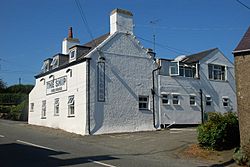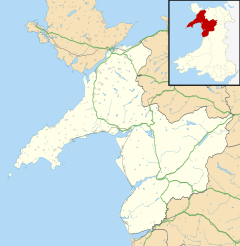Edern, Gwynedd facts for kids
Quick facts for kids Edern |
|
|---|---|
 The Ship |
|
| OS grid reference | SH274397 |
| • Cardiff | 116 miles SE |
| Community |
|
| Principal area | |
| Ceremonial county | |
| Country | Wales |
| Sovereign state | United Kingdom |
| Post town | PWLLHELI |
| Postcode district | LL53 |
| Dialling code | 01758 |
| Police | North Wales |
| Fire | North Wales |
| Ambulance | Welsh |
| EU Parliament | Wales |
| UK Parliament |
|
| Welsh Assembly |
|
Edern is a small village located in Gwynedd, a county in Wales. It used to be known as Edeyrn. This village is found on the north coast of the Llŷn Peninsula, close to Caernarfon Bay. You can find it about 1 kilometer southwest of a bigger village called Morfa Nefyn. The B4417 road runs right through Edern. The Afon Geirch river also flows through the village on its way to the Irish Sea.
Historic Buildings in Edern
Edern is home to some interesting old buildings. These include a church and a chapel, both with long histories. They show how people in the village have worshipped for many years.
St Edern's Church: A Victorian Gem
The Church of St Edern is a special building in the village. It was rebuilt between 1867 and 1868. However, parts of the church are much older. It is believed to stand on foundations from the Middle Ages. Some of its roof timbers even date back to the 15th century. Official records describe it as a "small Victorian church of simple character." This means it has a modest but charming design from the Victorian era.
Edern Chapel: A Rich Interior
Edern Chapel is another important religious building in Edern. It belongs to the Welsh Calvinistic Methodist faith. The first version of this chapel was built in 1775. Over the years, it was changed and rebuilt during the 19th century. What makes this chapel stand out is its inside. Its interior has been called "of exceptional elaboration." This suggests it has very detailed and decorative features inside.
Both St Edern's Church and Edern Chapel are listed as Grade II buildings. This means they are recognized as important historical and architectural sites. They are protected to make sure they are preserved for the future.


